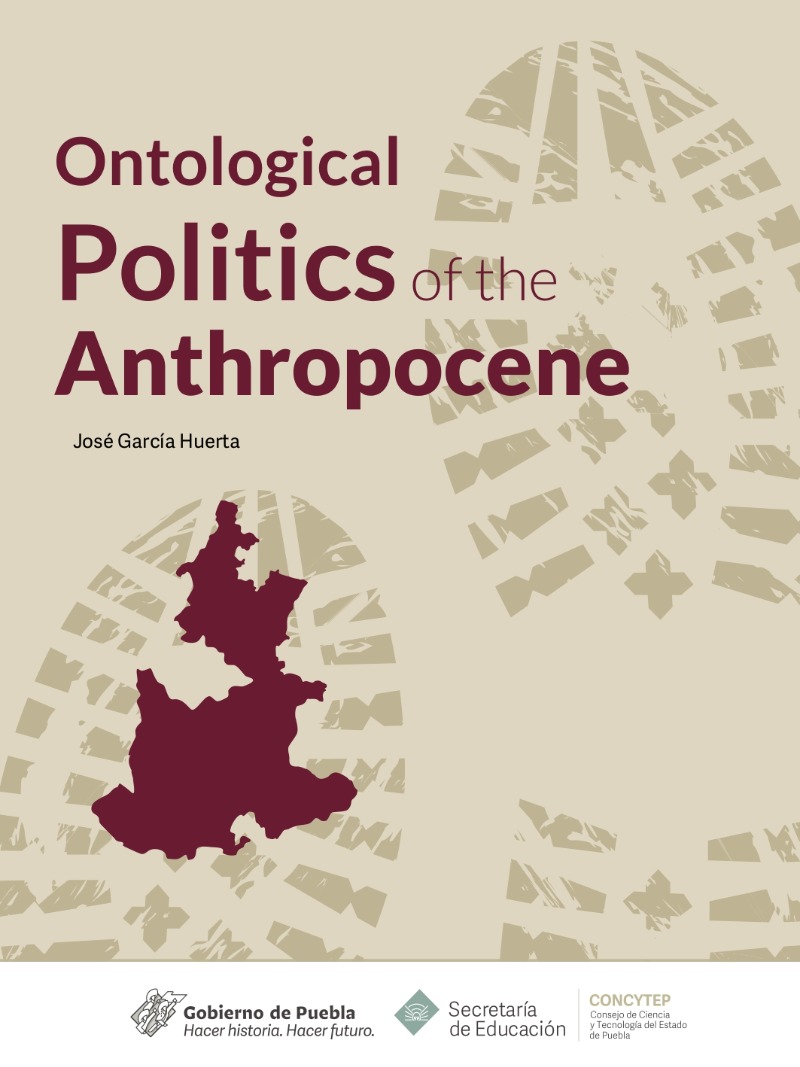
Ontological politics of the anthropocene
Colaboradores:
Covarrubias Salvatori, Victoriano Gabriel (Director del equipo editorial)
Muñoz Jiménez, Cinthia Paola (Diseñador)
Pérez Bedwell, Georgilett (Editor Literario)
Aguirre Rodríguez, Luis Gerardo (Coordinador editorial)
Editorial:Consejo de Ciencia y Tecnología del Estado de Puebla
Materia:Ciencias de la tierra
Público objetivo:General
Publicado:2023-01-06
Número de edición:1
Soporte:Digital
Formato:PDF
Idioma:Inglés
Libros relacionados
Manual para el muestreo de sedimentos lacustres para estudios paleoambientales - Caballero Miranda, Margarita Erna
Ecosistemas desérticos y su riqueza natural - Flores Márgez, Juan Pedro; Jiménez Cervantes, Jaime Arturo; Mendoza Carreón, Gabriela; Osuna Ávila, Pedro; Rodríguez Amador, Roosevelt; Ceron Ortiz, Ana Nallely; Ramirez Gerardo, Marithza Guadalupe; Contreras López, Christhopher; Zapata Caldo, Mariela; Escobar León, Martha Celia; Delgadillo Escobar, Ariel Armando; Muñoz Beltrán, Susana; Rosales Márquez, Ebsheidi Yaritza; Olivas Sánchez, Martha Patricia; Quiñónez Martínez, Miroslava; Garza Ocañas, Fortunato; Aldama Meza, José Nicolás Lauro; Rivas Cáceres, Raymundo René; Torres López, Telma Griselda; Flores Córdova, María Antonia; Espinosa Alonso, Laura Gabriela; Rodríguez Roque, María Janeth; Salas Salazar, Nora Aideé; Soto Caballero, Mayra Cristina; Carlo Rojas, Zarhelia; Valero Galván, José; Almodóvar Delgado, Fabian Isaías; González Fernández, Raquel; Torres Torres, Ángela Lucia; Pérez Álvarez, Sandra; Rascón Solano, Joel; Uranga Valencia, Luisa Patricia; Grijalva Martínez, Iván
Microbiología y biogeoquímica del suelo: teoría y aplicaciones - Bautista Zuñiga, Francisco; Palma López, David Jesús; Ayala Niño, Fernando; Montiel González, Cristina; García Gutiérrez, Diana Hansel; Sánchez López, José Francisco; Arteaga Mejía, Maricela; Castillo Granada, Lourdes; Castillo Villanueva, Elizabeth; Valdivia Anistro, Jorge Antonio; Montaño Arias, Susana Adriana; Chimal Sánchez, Eduardo; Camargo Ricalde, Sara Lucía; Chávez Vergara, Bruno Manuel; Jiménez Martínez, Arturo; Perroni Ventura, Yareni; Medorio García, Heidi Patricia; Hernández Romero, Ángel Héctor; Hernández Vargas, Guadalupe; Domínguez Eusebio, Carlo Alberto; Jiménez Aguilar, Angélica; Téllez Espinosa, Joselyn Guadalupe; Méndez Velázquez, Ruth; Fuentes Ponce, Mariela Hada; González Ortega, Emmanuel; Moreno Espíndola, Iván Pável; González Monterrubio, César Fernando; Medina Morales, Paula; Trejo Aguilar, Dora; Bañuelos Trejo, Jacob Isaías; Baeza Guzmán, Yajaira; Sánchez Landero, Luz Amelia; Escalante Rebolledo, María Ariadna; De la Rosa Mera, Claudia Janette; Alarcón, Alejandro; Ferrera Cerrato, Ron
Tormentas convectivas severas en México: - León Cruz, José Francisco
Reseña
The physical world we Iive in is a complex and dynamic system that exists from the constant interaction of its elements. Certain variables of this system, that can be tracked down in time, Show fluctuation within specific stable parameters for approximately the last 10,000 years, during the geological epoch Holocene, Where life as we know it emerged and evolved, These conditions have changed in the last centuries, and some
Parameters like the amount of CO2 in the atmosphere are way out of the boundaries where they moved for the last millennia. The driver of these changes are the activities conducted by the human species as a whole.
It was, however, only at the beginning of the new millennia that a call to recognise the planetary scale of the impact of human activities gained ground in the geological sciences, and in a growing number of disciplines and in the public spheres. This call was made by the Nobel Prize winner and atmospheric biochemist Paul Crutzen, and Eugene Stoermer, a biologist and diatoms specialist, who recommended the current geological epoch be named ′Anthropocene’ to ′′emphasize the central role of mankind in geology and ecology’ ’(Crutzen & Stoermer, 2000: 17. The Anthropocene concept started to ignite debates across an ever-increasing range of disciplines, including geopolitics (DaIby, 2007,
biodiversity conservation (Braverman, 2014), global environmental law, governance, human rights (Kotzé, 2014a; 2014b; Biermann et al., 2016〉, and the human existence as species (Roelvink, 2013; Malm & Homborg, 2014) among many others.




